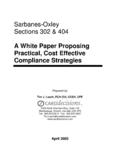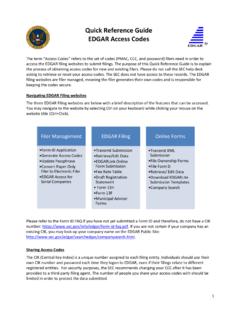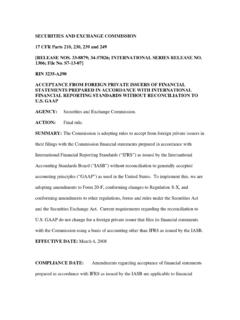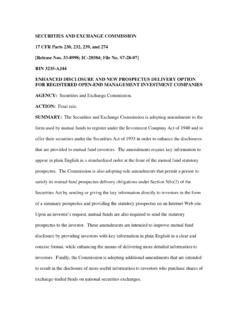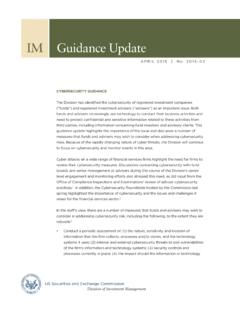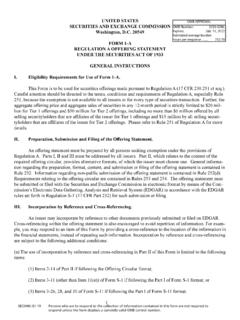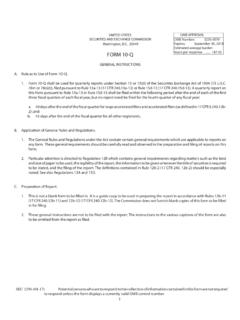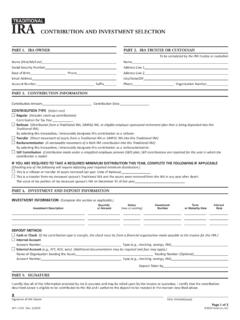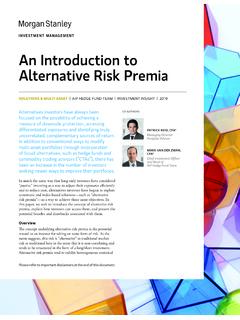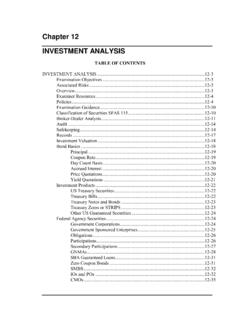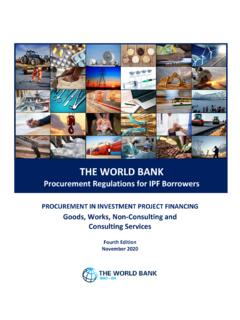Transcription of Final Rule: Political Contributions by Certain Investment ...
1 SECURITIES AND EXCHANGE COMMISSION. 17 CFR Part 275. Release No. IA-3043; File No. S7-18-09. RIN 3235-AK39. Political Contributions by Certain Investment Advisers AGENCY: Securities and Exchange Commission. ACTION: Final rule. SUMMARY: The Securities and Exchange Commission is adopting a new rule under the Investment Advisers Act of 1940 that prohibits an Investment adviser from providing advisory services for compensation to a government client for two years after the adviser or Certain of its executives or employees make a contribution to Certain elected officials or candidates. The new rule also prohibits an adviser from providing or agreeing to provide, directly or indirectly, payment to any third party for a solicitation of advisory business from any government entity on behalf of such adviser, unless such third parties are registered broker-dealers or registered Investment advisers, in each case themselves subject to pay to play restrictions.
2 Additionally, the new rule prevents an adviser from soliciting from others, or coordinating, Contributions to Certain elected officials or candidates or payments to Political parties where the adviser is providing or seeking government business. The Commission also is adopting rule amendments that require a registered adviser to maintain Certain records of the Political Contributions made by the adviser or Certain of its executives or employees. The new rule and rule amendments address pay to play practices by Investment advisers. DATES: Effective Date: September 13, 2010. --2-- Compliance Dates: Investment advisers subject to rule 206(4)-5 must be in compliance with the rule on March 14, 2011. Investment advisers may no longer use third parties to solicit government business except in compliance with the rule on September 13, 2011.
3 Advisers to registered Investment companies that are covered Investment pools must comply with the rule by September 13, 2011. Advisers subject to rule 204-2 must comply with amended rule 204-2 on March 14, 2011. However, if they advise registered Investment companies that are covered Investment pools, they have until September 13, 2011 to comply with the amended recordkeeping rule with respect to those registered Investment companies. See section III of this Release for further discussion of compliance dates. FOR FURTHER INFORMATION CONTACT: Melissa A. Roverts, Senior Counsel, Matthew N. Goldin, Branch Chief, Daniel S. Kahl, Branch Chief, or Sarah A. Bessin, Assistant Director, at (202) 551-6787 or Office of Investment Adviser Regulation, Division of Investment Management, Securities and Exchange Commission, 100 F Street, NE, Washington, DC 20549-8549.
4 SUPPLEMENTARY INFORMATION: The Commission is adopting rule 206(4)-5. [17 CFR (4)-5] and amendments to rules 204-2 [17 CFR ] and 206(4)-3. [17 CFR (4)-3] under the Investment Advisers Act of 1940 [15 80b]. ( Advisers Act or Act ).1. 1. 15 80b. Unless otherwise noted, when we refer to the Advisers Act, or any paragraph of the Advisers Act, we are referring to 15 80b of the United States Code, at which the Advisers Act is codified, and when we refer to rule 206(4)-5, rule 204-2, rule 204A-1, rule 206(4)-3, or any paragraph of these rules, we are referring to 17. CFR (4)-5, 17 CFR , 17 CFR and 17 CFR (4)-3, respectively, of the Code of Federal Regulations, in which these rules are published. --3-- TABLE OF CONTENTS.
5 I. BACKGROUND .. 5. II. DISCUSSION .. 15. A. First Amendment Considerations .. 19 B. Rule 206(4)-5 .. 25 1. Advisers Subject to the 29 2. Pay to Play Restrictions .. 31 (a) Two-Year Time Out for Contributions .. 31 (1) Prohibition on 38 (2) Officials of a Government Entity .. 43 (3) 46 (4) Covered Associates .. 49 (5) Look Back .. 58 (6) Exceptions for De Minimis Contributions .. 62 (7) Exception for Certain Returned 65 (b) Ban on Using Third Parties to Solicit Government Business .. 70 (1) Registered Broker-Dealers .. 87 (2) Registered Investment 90 (c) Restrictions on Soliciting and Coordinating Contributions and Payments. 93 (d) Direct and Indirect Contributions or Solicitations .. 96 (e) Covered Investment Pools.
6 97 (1) Definition of Covered Investment Pool .. 102 (2) Application of the Rule .. 109 (3) Subadvisory Arrangements .. 111 (f) Exemptions .. 114 D. Recordkeeping .. 116 E. Amendment to Cash Solicitation 121 III. EFFECTIVE AND COMPLIANCE 122. A. Two-Year Time Out and Prohibition on Soliciting or Coordinating Contributions .. 122 B. Prohibition on Using Third Parties to Solicit Government Business and Cash Solicitation Rule 123 C. Recordkeeping .. 125 D. Registered Investment 125 IV. COST-BENEFIT 127. A. Benefits .. 130 B. 136. 1. Compliance Costs Related to Rule 206(4)-5 .. 136 2. Other Costs Related to Rule 206(4) 148 (a) Two-Year Time 148 (b) Third-Party Solicitor 154 3. Costs Related to the Amendments to Rule 204-2.
7 159 --4-- V. PAPERWORK REDUCTION ACT .. 162. A. Rule 162 B. Rule 206(4)-3 .. 171 C. Rule 206(4)-7 .. 174 D. Rule 176 VI. Final REGULATORY FLEXIBILITY ANALYSIS .. 176. A. Need for the Rule .. 179 B. Significant Issues Raised by Public Comment .. 180 C. Small Entities Subject to Rule .. 181 D. Projected Reporting, Recordkeeping, and Other Compliance 183 E. Agency Action to Minimize Effect on Small Entities .. 184 VII. EFFECTS ON COMPETITION, EFFICIENCY AND CAPITAL FORMATION .. 188. VIII. STATUTORY AUTHORITY .. 191. --5-- I. BACKGROUND Investment advisers provide a wide variety of advisory services to state and local governments,2 including managing their public pension These pension plans have over $ trillion of assets and represent one-third of all pension They are among the largest and most active institutional investors in the United States;5 the management of these funds affects publicly held companies6 and the securities But most significantly, their management affects taxpayers and the beneficiaries of these 2.
8 See SOFIA ANASTOPOULOS, AN INTRODUCTION TO Investment ADVISERS FOR STATE. AND LOCAL GOVERNMENTS (2d ed. 2007); Werner Paul Zorn, Public Employee Retirement Systems and Benefits, LOCAL GOVERNMENT FINANCE, CONCEPTS AND. PRACTICES 376 (John E. Peterson & Dennis R. Strachota eds., 1st ed. 1991) (discussing the services Investment advisers provide for public funds). 3 To simplify the discussion, we use the term public pension plan interchangeably with government client and government entity in this Release. However, our rule applies broadly to Investment advisory activities for government clients, such as those mentioned here in this Section of the Release, regardless of whether they are retirement funds. For a discussion of how the proposed rule would apply with respect to Investment programs or plans sponsored or established by government entities, such as qualified tuition plans.
9 Authorized by section 529 of the Internal Revenue Code [26 529] and retirement plans authorized by section 403(b) or 457 of the Internal Revenue Code [26 403(b) or 457], see section (e) of this Release. 4 BOARD OF GOVERNORS OF THE FEDERAL RESERVE SYSTEM, FLOW OF FUNDS ACCOUNTS. OF THE UNITED STATES, FLOWS AND OUTSTANDINGS, FOURTH QUARTER 2009 78. (Mar. 11, 2010). Since 2002, total financial assets of public pension funds have grown by 28%. Id. 5 According to a recent survey, seven of the ten largest pension funds were sponsored by state and municipal governments. The Top 200 Pension Funds/Sponsors, PENS. & INV. (Sept. 30, 2008), available at 6 See Stephen J. Choi & Jill E. Fisch, On Beyond CalPERS: Survey Evidence on the Developing Role of Public Pension Funds in Corporate Governance, 61 VAND.
10 L. REV. 315 (2008) ( Collectively, public pension funds have the potential to be a powerful shareholder force, and the example of CalPERS and its activities have spurred many to advocate greater institutional activism. ). 7 Federal Reserve reports indicate that, of the $ trillion in non-federal government plans, $ trillion is invested in corporate equities. BOARD OF GOVERNORS OF THE FEDERAL. RESERVE SYSTEM, supra note 4, at 78 --6-- funds, including the millions of present and future state and municipal retirees8 who rely on the funds for their pensions and other Public pension plan assets are held, administered and managed by government officials who often are responsible for selecting Investment advisers to manage the funds they oversee.


